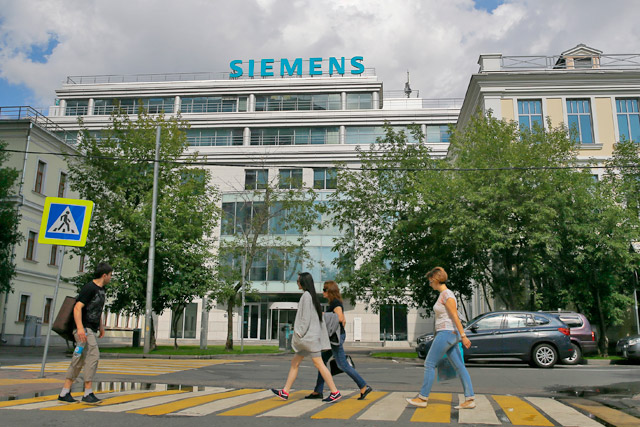FRANKFURT/MOSCOW — Germany's Siemens tried to distance itself from a Crimean sanctions scandal on Friday, halting deliveries of power equipment to Russian state-controlled customers and reviewing supply deals.
The industrial group said it now had credible evidence that all four gas turbines it delivered a year ago for a project in southern Russia had been illegally moved to Crimea, confirming a series of Reuters reports over the past weeks.
The move is embarrassing for Russia which stands accused of disregarding EU sanctions and of flouting its original agreement with Siemens and it also risks making European companies more cautious about doing business there. The Kremlin declined to comment, saying it was a matter for the companies involved.
Siemens said it had not yet found proof that it had violated sanctions itself, reiterating that the turbines had been locally modified and unlawfully moved to Crimea against its will and in breach of contractual agreements.
Crimea is subject to EU sanctions on energy equipment since Russia annexed the Black Sea peninsula in 2014. Russian President Vladimir Putin has promised to provide the region with a stable energy supply.
"This development constitutes a blatant breach of Siemens' delivery contracts, trust and EU regulations," Siemens said.
Siemens said it would "take immediate and decisive action" if it discovered further indications that export control regulations had been violated.
Siemens shareholders appeared supportive of its response.
Fund manager Max Anderl of UBS Asset Management, one of the top 20 investors in Siemens, said: "You could ask for the products back but if the customer does not cooperate there is little that can be done. The quick reaction time and the decision taken today show strong governance."
Siemens said it would now divest its minority stake in joint venture Interautomatika (IA), which sources have told Reuters was involved in the installation and commissioning of the turbines in Crimea, and suspend its two representatives on IA's supervisory board. Siemens has a 45.7 per cent stake in the business.
Siemens said it had also reviewed its licensing agreements with Russian companies associated with the matter, and was reviewing potential cooperation between its subsidiaries and other entities around the world regarding deliveries to Russia.
Matthias Schepp, head of the German-Russian chamber of commerce, said: "German companies ought to be able to depend on contracts being upheld."
He added: "The German-Russian chamber of commerce is not aware of any violations on the part of German companies."
Long history
Munich-based multinational Siemens has been active for 170 years in Russia, where its primary activities are supplying energy equipment and rail technology.
Its business there has slowed in recent years as the Russian economy struggled with the falling oil price and the impact of sanctions. Siemens made sales of 1.2 billion euros ($1.4 billion) in Russia last year, about 2 per cent of its total.
German business weekly Wirtschaftswoche reported this week that President Vladimir Putin last September promised Sigmar Gabriel, then economy minister and now foreign minister, that the turbines would not end up in Crimea.
Dmitry Peskov, Putin's spokesman, declined to comment when asked by Reuters on Friday whether that was true.
It was not clear whether Russia might retaliate against Siemens by ending cooperation in other areas. Russia uses Siemens trains on its high speed Sapsan rail network. However, those trains cost Moscow over 1 billion euros to buy and cover with a 30-year Siemens service contract.
Siemens also has a joint venture in Russia which manufactures passenger trains.
Siemens said it would put in place additional controls to ensure that energy equipment in future will only be dispatched once Siemens has confirmed it can be installed at the agreed destination.
Any new business in gas turbine equipment will be executed only by its majority-owned Siemens Gas Turbines Technologies joint venture with Russia's Power Machines, and its wholly owned subsidiary, OOO Siemens, it said.
Siemens spokesman Wolfram Trost said the Crimean affair had not sparked a wider review of compliance at Siemens, which battled a worldwide bribery scandal a decade ago, resulting in a then-record $1.6 billion fine from the US Justice Department.
Siemens renewed its offer to buy back the turbines and cancel the original contract with state-owned Technopromexport (TPE), against whom it is taking legal action intended to stop further deliveries to Crimea and to return the turbines to their original destination of Taman in southern Russia.
Evgeny Rodin, partner at Moscow law firm Vegas Lex, said he doubted the turbines would be returned. "One can assume that while the legal case is ongoing the turbines will be installed," he said.
Russia will press ahead with plans to build two new power stations in Crimea, said Andrei Cherezov, a Russian deputy energy ministry, the RIA news agency reported.
Technopromexport, which is now building the new Crimean power plants, did not respond to a request for comment on Friday.
